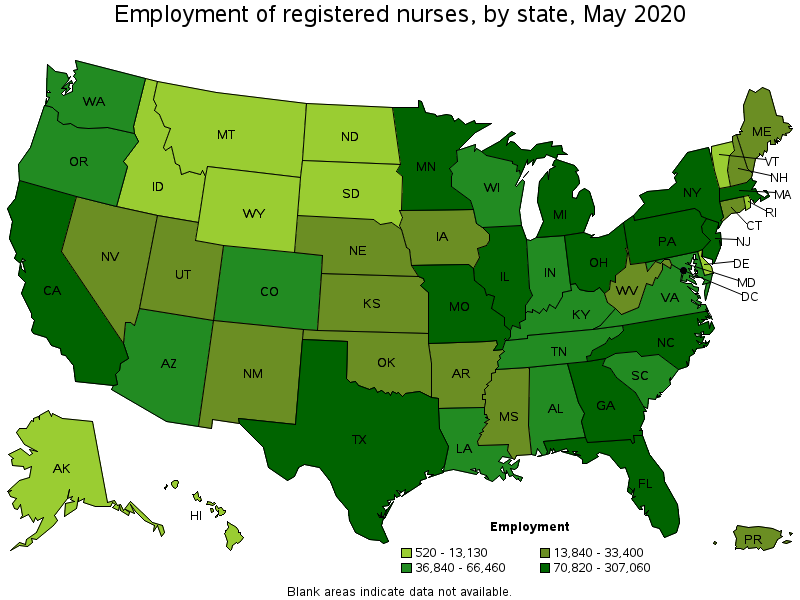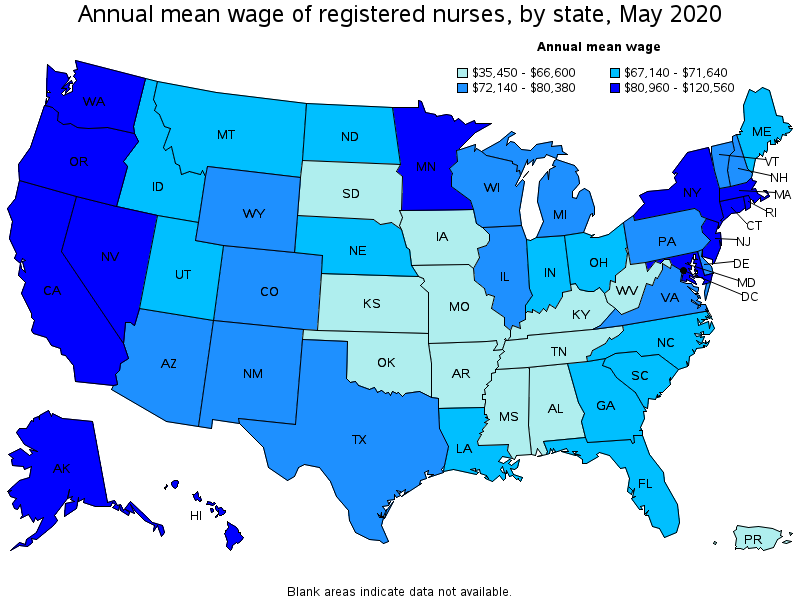Like other medical professions, nursing is highly specialized, giving journalists the opportunity to include more voices in their health and medical stories. Nurses in different specialties can offer perspective not only about patient care, but also clinical research, ethical issues and management.
“Nurses have a different perspective than physicians,” Diana Mason, a nurse, a professor at the Center for Health Policy and Media Engagement at the George Washington University School of Nursing, and the former editor-in-chief of the American Journal of Nursing, said in an interview with The Journalist’s Resource in 2020. “If you’re not interviewing a nurse, you may be missing the best part of the story.”
There are more than 3.8 million registered nurses in the U.S. Registered nurse jobs are projected to grow by 9% from 2020 to 2030, according to the U.S. Bureau of Labor Statistics, with about 194,500 job openings each year over the decade. The median annual pay for registered nurses in 2020 was $75,330, ranging from $53,000 to $116,000.

Given the diversity of specialties in nursing, it’s important for journalists to note the nurses’ specialties the same way they note physician specialties.
Although nursing is used as a general term in the news media, there are different nursing degrees, certifications, credentials and licensing requirements. (A certification is granted by a non-governmental agency or organization while licensure is issued by a state agency.)
Registered nurses (RNs) typically have an associate or a Bachelor’s degree. They can also advance their studies with a Master’s degree, a Ph.D. or DNP (Doctor of Nursing Practice). With advance degrees, nurses can further their careers in clinical practice, academia, research, administration, public health, entrepreneurship and policy. All students who enter registered nurse practice will take the NCLEX national examination, which is developed by the national council of the state boards of nursing.
Nurses who pursue a master’s or doctoral degree (DNP) can become certified and/or licensed as nurse practitioners (NP), certified nurse midwife, certified registered nurse anesthetists or clinical nurse specialists. The advanced degree also opens more doors for leadership, research and administration jobs.
Certifications for non-registered nurses, include a certified nursing assistant, or CNA, which requires a 4- to 12-week training. CNAs help the nursing team and provides basic care, such as daily living tasks. A licensed practical nurse, or LPN, is a 1 to 2-year certificate, which includes clinical experience. An LPN provides higher level of care than a CNA, including first aid and updating health records.

In addition to larger national groups, like the American Nurses Association, journalists can reach out to specialty associations for comments. Below is a list of some of the nursing specialty groups in the United States. For a complete list, visit nurse.org/orgs.shtml.
Academy of Medical-Surgical Nurses: Medical-surgical nursing is one of the largest nursing specialties in the U.S. Med-surg nurses provide care to adults with a variety of medical issues during, before and after surgery. They practice in hospitals, outpatient settings, in homes and via telemedicine. They can share their stories from a unique perspective, as they are embedded in so many levels of patient care, staffing, and advocacy issues, daily.
Website: amsn.org
Twitter: @MedSurgNurses
Media contact: Janet D’Alesandro, janetd@ajj.com
American Academy of Ambulatory Care Nurses: Ambulatory care nurses are frontline providers and experts who practice in a wide range of outpatient settings including health centers, government institutions, universities, military clinics, and communities. They work as clinicians, telehealth nurses, care coordinators, researchers, educators, administrators, patient advocates and C-suite executives. The organization has 4,300 members.
Website: aaacn.org
Twitter: @AmbCareNursing
Media contact: Janet D’Alesandro, janetd@ajj.com
American Association of Colleges of Nursing: The association represents academic nursing and schools of nursing in public and private universities in the U.S. AACN also has fact sheets and data on nursing enrollment, graduation and shortage.
Website: aacnnursing.org
Twitter: @AACNursing
Media contact: aacnnursing.org/News-Information/Media-Inquiries
American Association of Critical-Care Nurses: Critical nurses typically work in the intensive care units and provide care to patients with life-threatening illnesses and injuries. AACN facilitates interviews with nurses from the bedside to the boardroom and with subject matter experts, including researchers and clinicians who are published in its three peer-reviewed journals. The association’s resources for journalists include an online newsroom, nurse stories and a blog written by nurses for nurses.
Website: AACN.org
Publications: aacn.org/education/publications
Twitter: @AACNme
Media contact: Kristie Aylett, kristie.aylett@aacn.org
American Association of Neuroscience Nurses: Neuroscience nurses typically help patients with brain and nervous system disorders such as strokes and Alzheimer’s disease. AANN has experts in a variety of neuro sub-specialties including stroke, concussion, epilepsy, brain tumors, spinal trauma, MS, Parkinson’s disease and traumatic brain injury. Neuroscience nurses work in clinical, research, administrative, and educational settings, covering diverse areas of neuroscience patient care.
Website: AANN.org
Journal: Journal of Neuroscience Nursing
Twitter: @neuronursesAANN
Media contact: Allison Begezda, abegezda@aann.org
American Nephrology Nurses Association: Nephrology nurses care for patients and families with or at risk for kidney disease. They work in such areas as peritoneal dialysis, hemodialysis, continuous renal replacement therapies, transplantation, industry and government/regulatory agencies.
Website: annanurse.org
Twitter: @ANNAnurses
Media contact: Janet D’Alesandro, janetd@ajj.com
American Psychiatric Nurses Association: APNA represents registered nurses and advanced practice nurses are behavioral health professionals who provide psychiatric, mental health and substance use disorder care. Psychiatric nurses practice in a variety of settings, from hospitals to community mental health centers, to private practice. They have specialized expertise in areas such as substance use, child and adolescent populations, geriatric populations and serious mental illness. Major APNA initiatives include suicide prevention, opioid use disorders, mental health recovery, nurse well-being, and increasing access to psychiatric-mental health care in underserved areas.
Website: apna.org
Journal: Journal of the American Psychiatric Nurses Association
Twitter: @AmerPsychNurses
Media contact: Meaghan Trimyer, mtrimyer@apna.org
Emergency Nurses Association: Emergency, or ER, nurses care for patients in crisis situations in emergency rooms and urgent care clinics. ENA advocates for patient safety, develops industry-leading practice standards and guidelines, and guides emergency healthcare public policy. ENA members have expertise in triage, patient care, disaster preparedness and all aspects of emergency care.
Website: ena.org
Journal: Journal of Emergency Nursing
Twitter: @ENAorg
Media contact: Dan Campana, dan.campana@ena.org
Gerontological Advanced Practice Nurses Association: Gerontological nurses care for older adults. GAPNA members are active in academia, research, and a wide variety of settings across the health care continuum. These include primary care, acute care, post-acute care, home care and long-term care.
Website: gapna.org
Journal: Geriatric Nursing Journal
Twitter: @GAPNA_HQ
Media contact: Janet D’Alesandro, janetd@ajj.com
Hospice & Palliative Nurses Association: Hospice and palliative nurses have a variety of roles, including assessment and treatment of potentially life-limiting illnesses. They work in settings like patient homes, residential hospices, clinics, long-term care and inpatient facilities. HPNA is the national professional organization that represents the specialty of palliative nursing, which includes hospice and palliative nurses. It supports the profession through education programs, research initiatives and advocacy.
Website: advancingexpertcare.org
Twitter: @HPNAinfo
General contact: info@hpna.org
National Association of Hispanic Nurses: It promotes safe, quality health care delivery to Latino communities and individuals, and recognizes excellence among Latino nurses and provides formal and informal mentoring opportunities. It has 47 local chapters, representing the voices of Latino nurses in the U.S.
Website: nahnnet.org
Journal: Hispanic Health Care International
Twitter: @nahnnursing
Media contact: communication@thehispanicnurses.org
National Association of Indian Nurses of America: The association’s primary goal is to unite all Indian nurses and nursing students of Indian origin and heritage as a professional body under one umbrella at national level. The association is the official voice for Indian nurses in America and outside for professional nursing issues and problems.
Website: nainausa.org
Twitter: @NainaUsa
General contact: secretary@nainausa.org
National Black Nurses Association: It represents African American nurses from the USA, Canada, Eastern Caribbean and Africa, with 115 chartered chapters nationwide.
Website: nbna.org
Twitter: @NbnaInc
Media contact: Keisha Ricks, kricks@nbna.org
National League for Nursing: It is a national organization for faculty nurses and leaders in nurse education and offers faculty development, networking opportunities, testing services, nursing research grants, and public policy initiatives.
Website: nln.org
Publications: nln.org/newsroom/newsletters-and-journal
Twitter: @NLN
Media contact: Mike Keaton: mkeaton@nln.org
Oncology Nursing Society: The association represents oncology nurses, develops evidence-based education programs and treatment information, and advocates for patient care.
Website: ons.org
Twitter: @oncolognursing
Media contact: Nicole Lininger, nlininger@ons.org
Philippine Nurses Association of America: The association’s mission to uphold and foster the positive image and welfare of Filipino-American nurses, promote professional excellence, and contribute to significant outcomes to healthcare and society through education, research, and clinical practice.
Website: mypnaa.org
Journal: Journal of Nursing Practice Applications and Reviews of Research
Twitter: @mypnaa
General contact: infomypnaa@gmail.com
Society of Urologic Nurses and Associates: Urology nurses care for patients with urinary or reproductive problems. SUNA promotes education, research, and evidence-based clinical practice.
Website: suna.org
Journal: Urologic Nursing Journal
Twitter: @UrologicNurses
Media contact: Janet D’Alesandro, janetd@ajj.com


Expert Commentary